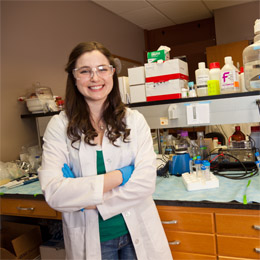 Sarah Thompson '12
Sarah Thompson '12By Rob O'Connor '95
Managing Editor
A chemical physics and bioethics major from Picayune, Miss., Sarah Thompson '12 was set on a smaller college rather than a large university when she read about Hendrix in Loren Pope's Colleges That Change Lives.
"I was really impressed with the research opportunities here," said Thompson, who received one of the college's prestigious Hays Scholarships. "There was a lot of emphasis on direct interaction with faculty."
As a high school student at the Mississippi School for Math and Science, she was placed in a research program at a nearby university.
"I learned the nature of science research ... that sometimes things don't work, and it takes a lot of work and discipline," she said. "It was a really important learning experience."
She encountered a similar experience at Hendrix as a full-time research assistant for two summers with chemistry professor Dr. Andres Caro. An experiment wasn't working and, after some deliberation, Dr. Caro told her and a classmate to go back to the books and figure it out, which they did.
"It was neat to have this problem, just a question, that we were entrusted to take on our initiative and figure it out," she said. "It was a small moment but really meaningful."
Thompson particularly enjoyed the daily discussions with Dr. Caro during her summer research.
"That's something our professors do really well. They really bring students into research," she said. "The focus is really on teaching."
"It takes so much time," she said. "They could get things done so much faster if they didn't spend so much time helping students."
"I have encountered teachers in the past, outside of Hendrix, who were dismissive, or even annoyed, by student questions," she said. "But teachers here are sincerely responsive and encouraging of student curiosity."
"The smaller class sizes and heavy involvement of faculty really make that possible," she said. "Feeling comfortable in asking questions has been tremendously meaningful and has helped develop a passion for scientific investigation that I will carry with me beyond the classroom and into my professional life."
Though she was initially interested in biology in high school, she was assigned to the university's chemical engineering department to observe student and faculty research.
"I fell in love with the program," she said. "So I gravitated to the physical sciences."
Her physical chemistry course at Hendrix with Dr. David Hales and organic chemistry course with Dr. Tom Goodwin were "very influential."
"That was really beneficial," she said. "To see how two branches of chemistry interact and be able to synthesize that was really cool and exciting ... and very, very useful."
As she pursued her interest in physical chemistry, she became "completely captivated" with philosophy after taking a course on ethical theory.
"I really liked the opportunity to talk about issues," she said. "It makes you remember why you're at a liberal arts school."
Her experience with philosophy led her to develop a second major in bioethics. She worked with philosophy professor Dr. Chris Campolo on an independent study, took courses in the history of bioethics and the allocation of scarce resources, and completed an internship with Dr. Micah Hester, director of medical humanities and clinical bioethicist at the University of Arkansas for Medical Sciences.
"I saw how hospitals are run and how bioethics is actually applied," she said of her internship experience.
She also took a bioethics course at Oxford University through the Hendrix-in-Oxford program.
"Being a science major and going abroad is not easy," she said. "My advisor [chemistry professor] Dr. Liz Gron helped me organize my classes and I'm really thankful we were able to do that."
Last spring, Thompson was one of three Hendrix students selected for the prestigious Goldwater Scholarship. The recognition was a reminder to Thompson that she wants to continue to be active in research.
After graduation, she will enroll in a joint M.D. / Ph.D. program at Johns Hopkins University in Baltimore, Md.
"What I really like about the combined degree is that you have a lot of opportunity to interact with patients, to teach, and to work in the lab," she said. "They all sort of edify each other. The research provides perspective as a physician and working with patients would lend certain gravity to what I do in the lab, and that's really interesting."